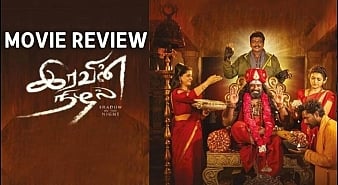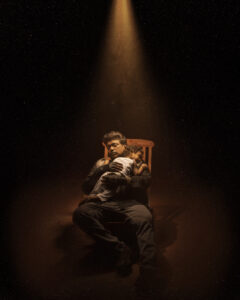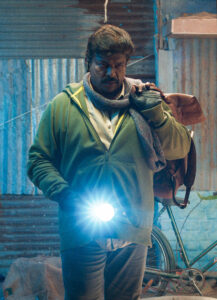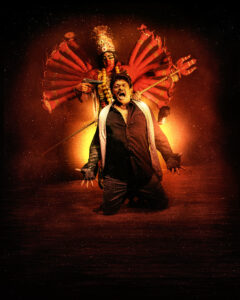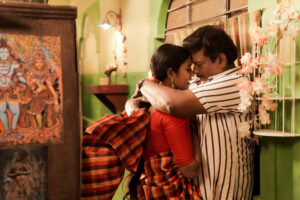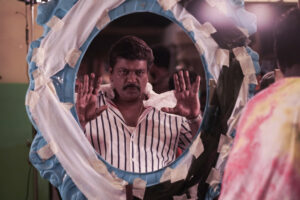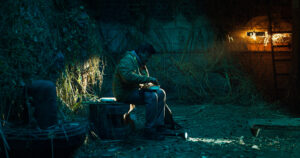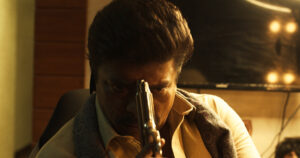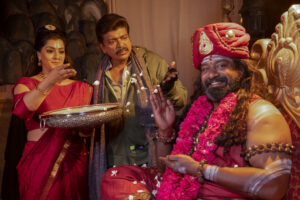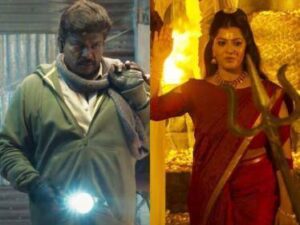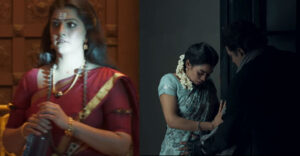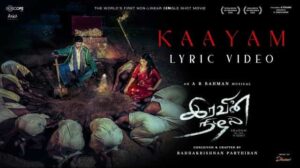IRAVIN NIZHAL Movie Review
Cast-;
Varalaxmi Sarathkumar , Robo Shankar , Brigida Saga , Chandru , Anandha Krishnan , Sneha Kumar ,Sai Priya nka Ruth and others .
Crew-;
Story, Screenplay, Dialogue, Direction – Radhakrishnan Parthiban , Music – A R Rahman (Academy Award win ner) Produced by – Bioscope USA, Akira Productions Pvt Ltd. , Producers – Caldwell Velnambi, Anshu Prabhakar, Dr.Bala Swaminathan, Dr. Pinchi Srinivasan, , Ranjith Dhandapani, Keerthana Parthiepan Akkineni & Radhakri shnan Par th iban , Cinematography – Arthur A. Wilson , Art Director – RK Vijaimurugan , Audiography – S.Siva kumar , VFX Supe rvisor – Cottalango Leon (Academy Award Winner) , Supervising Sound Editor – Craig Mann (Academy Award Winn er) , Supervising Sound Designer – Kunal Rajan , Co Director – P.Krishnamurthy , Lyrics – Kaduveli Siddhar, Madhan Karky, Rakendu Mouli & Radhakrishnan Parthiban , Line Producer – J Prabaahar , Exe cutive Producer- Raaki , Part hepan , Gimbal Operator – A.K.Akash , Focus Pullers – Shankar (D’Sosa), Rajesh , Choreography – Shanthi Kumar, Ba ba Baskar , Costume Designer – Sowbarnika , Stunt – Stun Siva , Publicity Designer – Kannadasan DKD , PRO – Nikil Murukan and others .
Story-;
The film opens with Nandu (Parthiban), a film financier, learning that the cops are about to arrest him, and makin g a run, with a gun, which he hopes to use ostensibly on Paramaanandha (Robo Shankar), a fake godman, who is o ne of those to have out him in this precarious position. As he waits at the godman’s dilapidated ashram, he reco unts his eventful life, the people who pushed him into darkness, his sins and the one flicker of light that’s still pa rt of his life.His birth resulted from his mother’s extramarital affair with their landowner. She’s murdered by her husband in a jealous rage. He’s raised by neighbours till he runs away aged 10. After being raped by a cop, he’s giv en refuge by a trans-woman, who uses him to deal marijuana. At 18 he falls in love with a girl who seems to re ciprocate his feelings, but ends up cheating on him for money, breaking his heart. Then he falls in love with Chil akkamma, a devout girl who reciprocates his feelings.
They marry and start up a small shop with the help of a tr ader who encourages him to get involved in the hawala trade which he’s forced to quit when the law catches up, rendering him unable to pay loan sharks who abuse his wife causing her to kill herself.He seeks refuge at the fake godman’s ashram, where he’s soon disillusioned upon discovering his true colours. An acolyte who was the godman’s cons ort [Varalakshmi Sarathkumar] exposes him, getting him arrested, to get his wealth. Upon discovering this, Nan du, who has a subsequent affair with, & impre gnates her, demands half of it, and kills her when she refuses. He’s then haunted by the cries of the unborn foe t us.He then becomes a notorious loan shark. He then coerces one of his debtors into marrying him and has a da ughter Arputha on whom he showers his love. His wife eventually warms to him. But when they find out that a debtor of his killed himself with his family due to his harassment, they leave him.Nandu reflects on all this, and out of guilt, pain and hopelessness he shoots himself dead.
Watch The Trailor-;
Movie Review-
Every film that Radhakrishnan Parthiban directs is a Parthiban Kanavu (Parthiban’s Dream). Ever since he made his directorial debut, Pudhiya Paadhai (1989), he has tried to bring newness to Tamil cinema. Newness can som etimes be daunting, too, because it may fail to create an impact and, therefore, drive the movies toward obscu rity. Many of his movies have disappeared without a trace that way. But he has bounced back every single time. And because he doesn’t aim to make box office bonanzas, his missteps aren’t appalling. But the few films that ha ve hit the right note are thoroughly enjoyable. Iravin Nizhal is a little bit of both. Although it was fun to be imme rsed in the world of his shadow, there was a gnawing voice in my head that constantly kept shouting: this is a gim mick – a gimmick so big that felt like he was pulling a rabbit out of a hat, which actually turned out to be a band an a. Actor and director Parthiban’s attempt at an entire film made in a single-take is an impressive technical fea t. In Iravin Nizhal, he oversees a host of characters, a story shifting back and forth over several years and claustr ophobic sets while also starring in the film.
Pulling all this together could have been no easy task, even without Parthiban telling you so. But he does. Repe atedly. The first half hour of the film’s run time is taken up by an increasingly dizzying making-of sequence, to the point I was worried I’d accidentally walked in at the end. This is the first single-take non-linear film in the world, we are told. Over and over again. When this sequence is finally over, the film cuts straight to the interval while audience members look around in confusion. Understandably, some didn’t return to their seats. When Iravin Ni zhal finally does begin, it quickly collapses into a self-indulgent tale loaded with violent misogyny and rape jokes. His character, Nandu, is a mix of violence and sarcasm. Sarcasm comes naturally to Parthiban. He doesn’t have to sit under a tree to find the right phrases for his feelings. But violence is something else altogether. And Iravin Ni zhal isn’t violent like a regular action film. You don’t see too much blood on the screen. However, Nandu grows up in an environment that thrives on humiliating him. And that, in turn, makes him choose violence.
At age ten, he’s given several packets of marijuana to sell. And later, when he’s heartbroken, he makes money by making cheap liquor. He quickly learns that he needs to become a bad person to survive in a bad place. Parthiban plays Nandhu, a ruthless loan shark haunted by his past crimes. As he prepares for a final stand-off with a cri mi nal godman (Robo Shankar) he’d once run afoul off, he tells us his life-story. It’s a story that cuts through time and complex sets that have to suggest far flung locations, so the camera has to keep pace without a break. On the tec hnical side that could have had you in awe at the movie-magic being spun in front of your eyes — if only the dir ector hadn’t spent a dull half an hour giving away all his tricks. At some point, an experimental film like this ne eds to speak for itself. Firstly because few movie-goers want to sit through a grand-standing lecture on the pit falls of single-take camera work. And secondly, because when the actual film finally plays out, the sub-par script is all the more aggravating.
Different actors play Nandu at different ages, but the single voice that stitches all the goings on in this non-linear thriller is that of Parthiban’s. He does most of the weightlifting in Iravin Nizhal to show that it’s his product after all. And he’s the face of it. He’s the body of it. Well, he’s also its soul. The entire first half of the movie until the po int of intermission runs on the wheels of its making. The cast and crew members praise the director for coming up with this particular subject and go on to talk about their fears since they haven’t worked on anything like this before. The making also focuses on the number of takes it took to nail this in a single shot from start to finish – ev en a small glitch becomes unacceptable.Iravin Nizhal movie review An experimental thriller that works only be cause of its experiment The making video is a guidebook on passion and perseverance. And I’m sure that its be auty will bewitch future filmmakers.
Parthiban thinks the unthinkable and pushes a boulder up a hill. And that’s why it doesn’t give me the same am ount of pleasure to dive into the details of the second half where the real story and screenplay are present. I’m not unconcerned about Nandu’s journey. I keenly observed the hardship he endured and the kind of life he asp ired for. At the bottom of it all, it’s mostly the story of a rags-to-riches man who doesn’t follow any principles. He wouldn’t have become rich in the first place if he had adopted a moral code. The film is proud of itself for choosi ng a non-linear narrative. What it really offers is a chaotic, unconvincing plot. The standoff between Nandhu and the godman-criminal, you’re led to imagine, is the centre point of the plot. So why doesn’t enough time go into bu ilding up this enmity? Robo Shankar’s role can almost be labelled as a cameo. He brings his usual brand of humou r, but hardly any villainy. His comical portrayal of similar godmen, who in real life con thousands of people, is sati sfying as parody.
Only, plot wise, it seems completely discordant with how his relationship with Nandhu plays out later. Anyway, Iravin Nizhal relies on extreme violence, mostly towards women, to tell its story. Nandhu’s is a life of horror and sin, in his own words. Parthiban’s voice over is a steady presence throughout to explain his chaotic script to you. As anchor points across a lifetime of crime are three women: his first love, a ‘perfect’ wife, and a debtor strong-armed into marrying him. Iravin Nizhal has a money lender (who probably spends a lot of time taking care of his curls), a godman in the name of a conman, a godman’s assistant who’s just as greedy as the godman, a kid who lo ves her father till her fantasy comes crashing down on her, a wife who unconditionally loves her husband, and so on. They are all somehow related to Nandu since he’s the one whom we are tracking. And A. R. Rahman’s thro b bing background score makes you think you’re watching an edge-of-the-seat thriller. But this is not a who dunit. You’re not solving any mystery here.
Sneha Kumar plays his first love Lakshmi. After she moves on to a local gangster (Stunt Silva), because he’s fin ancially better off, she is slut-shamed throughout the film. Nadhu later deals her ‘comeuppance’ through an off-screen assault that he narrates to the audience as a rape-joke. When Parthiban describes the gangster his first girlfriend leaves him for, he takes care to mention that the gangster gorges on beef biriyani, whatever that is su pposed to signal. It’s not like we’re told the meat in the many other biriyanis mentioned in the film. To put it pla inly, the loutish girlfriend-stealing, gangster speaking Madras Tamil is lowered caste, most likely Dalit. Sneha Ku mar plays his first love Lakshmi. After she moves on to a local gangster (Stunt Silva), because he’s financially be tter off, she is slut-shamed throughout the film. Nadhu later deals her ‘comeuppance’ through an off-screen as s ault that he narrates to the audience as a rape-joke. When Parthiban describes the gangster his first girlfriend le aves him for, he takes care to mention that the gangster gorges on beef biriyani, whatever that is supposed to sig nal.
It’s not like we’re told the meat in the many other biriyanis mentioned in the film. To put it plainly, the loutish girlfriend-stealing, gangster speaking Madras Tamil is lowered caste, most likely Dalit. Sneha Kumar plays his first love Lakshmi. After she moves on to a local gangster (Stunt Silva), because he’s financially better off, she is slut-shamed throughout the film. Nadhu later deals her ‘comeuppance’ through an off-screen assault that he narrates to the audience as a rape-joke. When Parthiban describes the gangster his first girlfriend leaves him for, he takes care to mention that the gangster gorges on beef biriyani, whatever that is supposed to signal. It’s not like we’re told the meat in the many other biriyanis mentioned in the film. To put it plainly, the loutish girlfriend-stealing, gangster speaking Madras Tamil is lowered caste, most likely Dalit.Brigida comes into his life next. Her Chilakkama is deliberately contrasted to Nandhu’s first romance with Lakshmi. Where Lakshmi lives in a clu tt ered slum, he meets Chilakkama at the temple where she sells flowers.
She is “divine”, his “goddess” who has come to briefly reform him. Lakshmi, to be taught a lesson later, is free-sp irited about her sex-life. Chilakkama is coy even after marriage — the ideal Kollywood blushing bride. Nandhu a nd her first-night is described as “pure”. And finally comes his second wife, played by Sai Priyanka Ruth, bullied into marrying him in place of the debts her family owes him. A wife about whom, too, Nandhu makes marital ra pe jokes. It takes audacious levels of misogyny on Parthiban’s part to give Sai the following dialogue right after the said joke: “I starteding caring for you seeing how good a father you are.” The sporadic applause and cackling from some of the audience, as gutting as it was, is just another reminder that rape culture is embedded deeply in our people.Brigida comes into his life next. Her Chilakkama is deliberately contrasted to Nandhu’s first romance with Lakshmi. Where Lakshmi lives in a cluttered slum, he meets Chilakkama at the temple where she sells flo w ers. She is “divine”, his “goddess” who has come to briefly reform him. Lakshmi, to be taught a lesson later, is free-spirited about her sex-life.
Chilakkama is coy even after marriage — the ideal Kollywood blushing bride. Nandhu and her first-night is descr ibed as “pure”. If you’re curious how a movie is made in a single-take, by all means go for Iravin Nizhal. Crew me mbers and stalwarts of Kollywood like Rajinikanth, Bhagiyaraj and Bharathiraaja, will waltz through the making-of sequence to offer their insights on the technical aspects. Even AR Rahman, the film’s music composer, is roped into this gimmick. His score swinging wildly between extreme pathos and high energy, is far too much to take in an already overwhelmingly confused film.Iravin Nizhal is at the least a crashing bore; at the worst, single-take m agic aside, a noxious mix of misogyny and self-indulgence.And finally comes his second wife, played by Sai Priya nka Ruth, bullied into marrying him in place of the debts her family owes him. A wife about whom, too, Nandhu makes marital rape jokes. It takes audacious levels of misogyny on Parthiban’s part to give Sai the following dialo gue right after the said joke: “I starteding caring for you seeing how good a father you are.”
The sporadic applause and cackling from some of the audience, as gutting as it was, is just another reminder that rape culture is embedded deeply in our people. Brigida comes into his life next. Her Chilakkama is deliberately c ontrasted to Nandhu’s first romance with Lakshmi. Where Lakshmi lives in a cluttered slum, he meets Chilakka ma at the temple where she sells flowers. She is “divine”, his “goddess” who has come to briefly reform him. Laksh mi, to be taught a lesson later, is free-spirited about her sex-life. Chilakkama is coy even after marriage — the ide al Kollywood blushing bride. Nandhu and her first-night is described as “pure”. And finally comes his second wif e, played by Sai Priyanka Ruth, bullied into marrying him in place of the debts her family owes him. A wife about whom, too, Nandhu makes marital rape jokes. It takes audacious levels of misogyny on Parthiban’s part to give S ai the following dialogue right after the said joke: “I starteding caring for you seeing how good a father you are.”
just another reminder that rape culture is embedded deeply in our people.Parthiban, though, might be solving s omething. He treats the movie as a Rubik’s cube where his character looks back at all the mistakes he’s made. Bu t he’s not interested in seeking forgiveness. He doesn’t become a saint one fine day. He’s still a bad egg. Nevert he less, he acknowledges that piece of fact in the end. Even then, the climactic resolution doesn’t reward the vie we rs with its impeccability. It is, frankly, a mess.Upendra, the other writer-director who’s known for churning out innovative screenplays, albeit in Kannada cinema, also gives too much importance to the protagonist and redu ces the supporting characters to the level of puppets. What I like about their movies anyway is that they are not afraid of stepping out of their comfort zones. Courage and foolishness sail in the same boat. If an idea works, the ideator will be hailed as a trailblazer. And if it doesn’t work, the ideator will be called a fool. It’s as simple as that. And since Iravin Nizhal comes with many labels attached to it, I’d say it’s a courageous project. It’d have been a better movie, however, if the story had more depth than a two-litre water bottle.
This IS MY Personal Review So Please Go And Watch The Movie In Theaters Only
Written By- T.H.PRASAD -B4U-Ratting-3 /5
